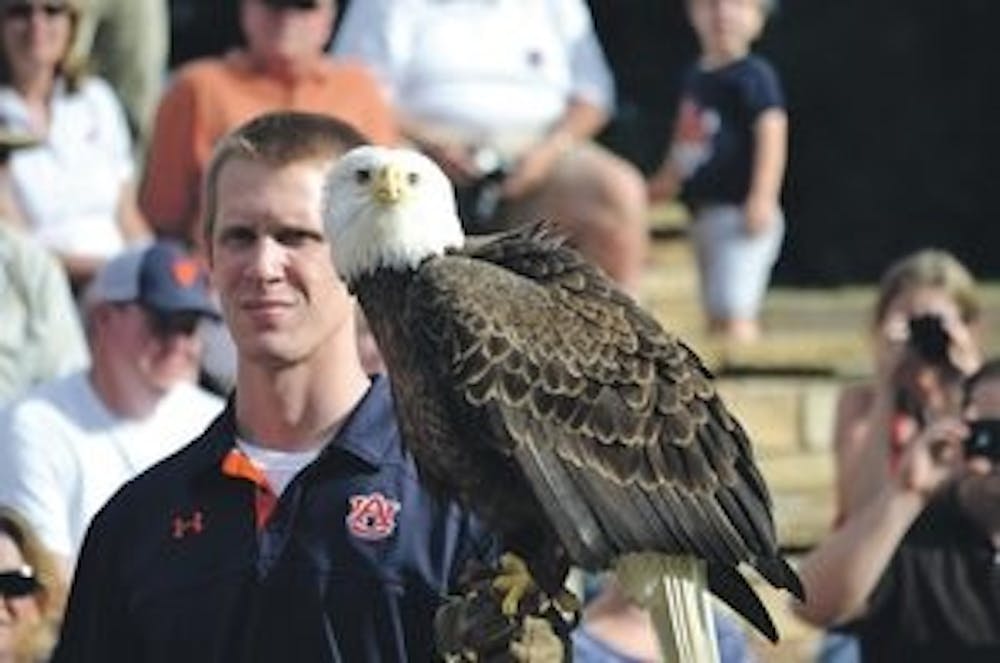Many Auburn fans know about Spirit, the bald eagles that flies around Jordan-Hare Stadium before home football games. His home, however, isn't as well-known.
The Southeastern Raptor Center, located at 1350 Pratt-Carden Drive, is a rehabilitation center for raptors, a category of birds that are hunters and are able to grab food with their claws. It is home to a variety of these birds, including owls, eagles, falcons and vultures.
This will be the seventh year the Raptor Center will host Football, Fans and Feathers, an event held every Friday afternoon before a home football game.
An outside amphitheater with stacked-stone benches allows spectators to watch as the birds are released from two wooden towers situated behind each side of the stage.
More than 200 orange-and-blue clad fans came out Friday, Sept. 14, to watch the birds soar through the air and down to the gloved arms of their trainers.
"Releasing them is the most rewarding thing it's an incredible feeling," said Taylor Wyatt, a sophomore in pre-veterinary medicine and volunteer at the Raptor Center.
An owl named Chaplin was shown to the crowd first, followed by a falcon. As the vulture was brought out, the Addams Family theme song played in the background as he skipped along to it. The raptor trainers chanted "vulture family" together.
Spirit was released from the tower last and was unveiled by a blue and orange Auburn blanket covering his cage.
"What a lot of people don't realize is that we fly our birds in the stadium just about every day," said Marianne Hudson, raptor specialist.
All of the birds at the Raptor Center are there because they would not be able to survive in the wild on their own. One of the birds only has one eye, and another was stolen from his nest as a baby.
"He has imprinted now, so he either thinks he's a little person or that we're all birds," said Carla Irene, volunteer at the rehabilitation center. "If we tried to release him he would most likely go back to where there is a lot of people, so we keep him here," she said.
As for Spirit, he lacks one important characteristic to survive in the wild.
"He's missing a sharp-hooked beak, so he can't tear his food very well, so that's why he lives at the Raptor Center," Hudson said. "He has flown at many games off and on since 2004, and has done a great job representing Auburn University."
Working with the birds is no easy feat.
"The most challenging thing is to make sure the eagle lands on the 50-yard line on game day, because we never know where the birds are going to go whenever we let them loose," Hudson said. "We're just holding our breath every time we let a bird fly free, whether it's an owl or an eagle, and then we really hope we get them back."
The task can even be dangerous.
"Its very humbling working with the birds," Wyatt said. "But they are wild animals and they will go after you sometimes--I definitely have some battle wounds."
Because the birds are raptors, it is in their nature to be aggressive.
"They have to hunt and kill things in the wild, so we just have to manage it, make sure that we're being safe and make sure we're not getting hurt," said Andrew Hopkins, raptor specialist at the Raptor Center who assists in training all the raptors.
In addition to caring for and training the birds, the raptor specialists also work to educate the public.
"What is often not known is (the raptor specialists) go around the state and teach and provide outreach to over 20,000 children a year," said Jamie Bellah, director of the Raptor Center.
"The best thing about the program is being able to educate the public," Irene said.
The next event will be Friday, Oct. 5 at 4 p.m. Admission is $5, and proceeds will help support the Raptor Center and go toward buying the necessary tools and food to properly take care of the birds.
Do you like this story? The Plainsman doesn't accept money from tuition or student fees, and we don't charge a subscription fee. But you can donate to support The Plainsman.





